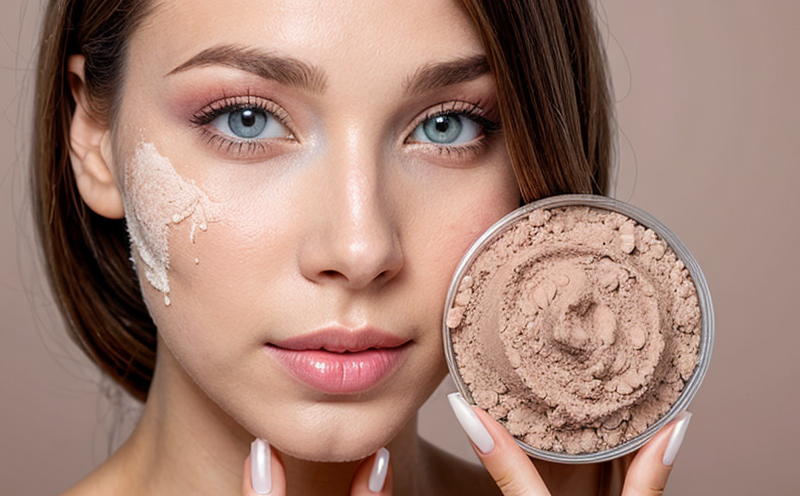Isothiazolinone Sensitization Testing in Beauty Products
In the cosmetics industry, ensuring product safety and efficacy is paramount. One critical aspect of this involves identifying potential allergens that can cause adverse reactions when used by consumers. Isothiazolinones are preservatives widely found in cosmetic products due to their effectiveness against microbial growth. However, these compounds have been linked with contact dermatitis, a type of allergic reaction characterized by skin irritation or inflammation following exposure.
The sensitization potential of isothiazolinones necessitates rigorous testing protocols aimed at detecting any risks associated with their use in beauty formulations. This service focuses specifically on assessing the sensitizing properties of these preservatives through standardized methods designed to mimic real-life scenarios closely. By doing so, manufacturers can make informed decisions regarding formulation adjustments or alternative ingredient selection.
Standardization plays a crucial role in ensuring consistency across different labs performing similar tests worldwide. For instance, ISO 10993-18 specifies guidelines for biological evaluation of medical devices, which also provides valuable insights into assessing allergenicity through skin patch testing procedures. Similarly, EU Regulation (EC) No 1223/2009 sets forth requirements related to cosmetic product safety evaluations, including provisions addressing potential irritancy and sensitization concerns.
At our laboratory, we employ advanced analytical techniques such as in vitro models like the Bovine Skin Permeation Model (BSPM) or human epidermal keratinocyte cultures to evaluate the release rate and penetration behavior of isothiazolinones into skin tissues. These approaches offer reliable data on both short-term and long-term effects, thereby providing comprehensive information about potential sensitization risks.
Furthermore, our team utilizes high-resolution imaging technologies combined with chemical analysis tools to monitor cellular responses following exposure to test substances. Such methodologies enable precise quantification of inflammatory markers indicative of allergic reactions, thus facilitating accurate assessment of sensitizing potency.
Our services extend beyond mere evaluation; they encompass full product lifecycle support from initial formulation development stages right through final commercial release. We collaborate closely with clients throughout this process to ensure alignment between scientific findings and business objectives. Our multidisciplinary approach integrates expertise in toxicology, microbiology, dermatology, and analytical chemistry to deliver holistic solutions tailored specifically for each client's needs.
By leveraging cutting-edge technology and adhering strictly to recognized international standards, we provide reliable, reproducible results that help clients meet regulatory obligations while enhancing product quality. Our commitment to excellence ensures that every test conducted contributes towards creating safer, more effective cosmetic products that delight consumers without compromising on safety.
Applied Standards
| Standard | Description |
|---|---|
| ISO 10993-18: Biological Evaluation of Medical Devices – Particular Considerations for Cosmetics | This standard addresses the biological evaluation of medical devices specifically designed or intended to come into contact with the skin. It provides guidance on assessing potential allergenicity using various in vitro and ex vivo testing methods. |
| EU Regulation (EC) No 1223/2009: Cosmetics Regulation | This regulation establishes rules for the manufacture, labeling, and placing of cosmetic products on the market within the European Union. It includes requirements related to safety assessments which may involve evaluating allergenic potential. |
Industry Applications
| Application Area | Description |
|---|---|
| Cosmetics Formulation Development | Determining the sensitizing potential of preservatives like isothiazolinones helps developers optimize formulations by avoiding ingredients likely to cause adverse reactions. This ensures compliance with regulatory requirements while enhancing consumer safety. |
| Regulatory Compliance | Avoiding non-compliance issues by ensuring that products meet stringent allergen and sensitization criteria set forth by governing bodies such as the EU Cosmetics Regulation or local authorities. |
| Risk Management | Identifying early-stage risks associated with specific ingredients allows companies to implement mitigation strategies promptly, reducing the likelihood of product recalls and brand damage. |
Why Choose This Test
The importance of isothiazolinone sensitization testing cannot be overstated given its critical role in safeguarding consumer health and protecting brand reputation. Here are several compelling reasons why selecting this service would be beneficial:
- Ensures Regulatory Compliance: Adhering to international standards like ISO 10993-18 and EU Regulation (EC) No 1223/2009 helps avoid penalties and sanctions associated with non-compliance.
- Promotes Consumer Safety: By minimizing the risk of adverse reactions, this testing enhances consumer trust and satisfaction.
- Facilitates Product Improvement: Understanding sensitization risks enables manufacturers to refine their formulations, potentially leading to innovation within the industry.
- Reduces Brand Damage: Early identification and addressing of sensitization concerns can prevent costly recall campaigns or negative publicity.





